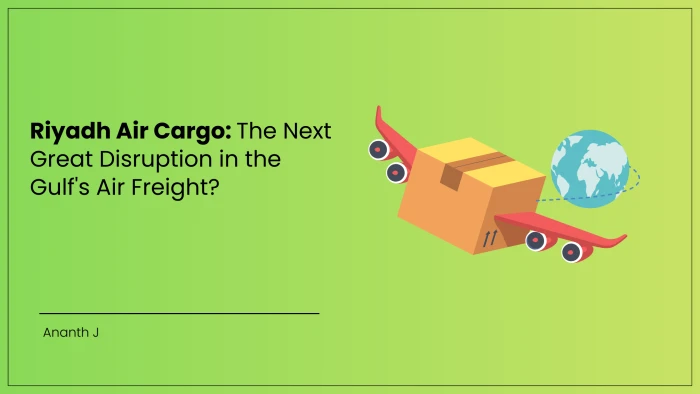For decades, Dubai has been the undisputed heavyweight champion of Middle Eastern air cargo, its dominance so entrenched that any challenge seemed almost unthinkable; but as Saudi Arabia’s Riyadh Air prepares for takeoff, the region’s air freight hierarchy faces its most audacious threat yet, a challenge not just to Dubai’s supremacy, but to the very structure of Gulf logistics.
The Battle for Air Freight Supremacy Begins
1. Vision 2030: The Catalyst for Change
Saudi Arabia’s Vision 2030 is a national transformation agenda with logistics and aviation at its core. The Kingdom aims to triple its air cargo capacity to over 4.5 million tonnes annually by 2030, up from just over 1.2 million tonnes in 2024. More than a numbers game, it’s a strategic bid to position Saudi Arabia as a global logistics powerhouse, connecting Asia, Europe, and Africa through its heartland.
2. Massive Infrastructure Investments
Billions of dollars are being poured into aviation infrastructure. The expansion of King Khalid International Airport in Riyadh and the development of the new King Salman International Airport, set to be one of the world’s largest, are designed to handle up to 3.5 million tonnes of cargo by 2050. These projects are complemented by new cargo zones, streamlined customs, and multimodal transport links, all aimed at creating a seamless logistics ecosystem.
3. E-Commerce and Industrial Mega-Projects
Saudi Arabia’s e-commerce sector is booming, with air cargo volumes for e-commerce growing by 23% year-on-year in 2024. The rise of mega-projects like NEOM, Qiddiya, and the Red Sea Global development is expected to generate unprecedented demand for air freight, as these futuristic cities and industrial zones require rapid, reliable logistics solutions.
4. Strategic Partnerships and Digital Transformation
Riyadh Air’s five-year partnership with SATS Saudi Arabia gives it instant access to a global network of over 225 stations and 250 airline partners. The deployment of SATS’ COSYS+ Next Generation Cargo Management System will enable real-time tracking, automated dock management, and data-driven decision-making, crucial for competing with Dubai’s mature digital infrastructure.
5. Leadership and Government Backing
At the helm is Tony Douglas, former CEO of Etihad Airways, bringing deep industry expertise. Riyadh Air is backed by the Public Investment Fund, ensuring the financial muscle to scale rapidly. This combination of leadership and government support positions Riyadh Air as a central pillar of Saudi Arabia’s aviation ambitions.
Head-to-Head: Where Riyadh Plans to Outfly Dubai
Network Ambitions: Riyadh Air plans to connect over 100 destinations worldwide, including London, New York, Mumbai, Paris, Dubai and Singapore, by 2030. This will directly challenge Emirates SkyCargo’s vast network, leveraging Saudi Arabia’s geographic position as a natural bridge between continents.
Cargo Capacity Race: While Emirates SkyCargo moved 2.3 million tonnes in 2024–25, Saudi Arabia’s national target is to exceed 4.5 million tonnes by 2030, with Riyadh Air expected to play a pivotal role in this surge.
Infrastructure Leapfrogging: Saudi investments in new airports, cargo terminals, and digital systems are designed to match, and eventually surpass, Dubai’s world-class facilities, including the 60,000 m² airfreight terminal at RUH.
Domestic Market Advantage: Unlike Dubai, Riyadh can tap into a vast and growing domestic market, driven by a young population, religious tourism, and industrial expansion, providing a stable base for cargo demand.
Regulatory and Economic Reforms: Saudi Arabia’s relaxation of foreign ownership rules, creation of Special Economic Zones, and customs modernization are making it easier for global logistics players to operate, challenging Dubai’s long-standing business-friendly reputation.
Strategic Altitude: What Riyadh Needs to Do to Lead the Skies
1. Building a Truly Global Network
To rival Dubai’s connectivity, Riyadh Air must aggressively expand its route map, prioritizing direct cargo links to major trade centers in Asia, Europe, and North America. Strategic alliances and codeshare agreements with global carriers will be essential to fill network gaps and offer seamless transit options.
2. Investing in Dedicated Cargo Fleet and Facilities
While initial operations will rely on the belly capacity of new widebody passenger jets (such as the 25 Airbus A350-1000s and 60 A321neos on order), Riyadh Air must invest in dedicated freighter aircraft to handle large-scale cargo and specialized shipments. The national cargo fleet is set to grow from 7 to 27 aircraft by 2030, but Riyadh Air’s own freighter acquisitions will be critical for flexibility and scale.
3. Creating World-Class Logistics Ecosystems
Dubai’s edge lies in its mature free zones and seamless customs. Riyadh must accelerate the development of Special Economic Zones with streamlined customs, tax incentives, and digitalized processes. Integration with Saudi Arabia’s expanding rail and road networks will be vital for multimodal efficiency.
4. Delivering Operational Excellence and Customer Experience
To win over global shippers, Riyadh Air must match Dubai’s standards in reliability, speed, and digital services. This means investing in advanced cargo management platforms, real-time tracking, and value-added services such as temperature-controlled logistics and e-commerce fulfillment. Building a strong, trustworthy cargo brand through targeted marketing and global partnerships will be equally important.
The contest between Riyadh and Dubai is a clash of national visions, economic strategies, and regional ambitions. Dubai’s dominance is built on decades of investment, world-class infrastructure, and a reputation for efficiency and openness. Emirates Group reported a profit of $5.6 billion in the financial year 2024-25, up by 10 percent from $5.1 billion in the previous year.
Yet, Saudi Arabia’s challenge is real and formidable. With Vision 2030 as its engine, Riyadh Air is spearheading a logistics revolution. Backed by deep financial resources, a vast domestic market, and a government committed to transformation, Riyadh Air Cargo is poised to disrupt the status quo.
For regional businesses and global shippers, this intensifying rivalry promises more choice, better services, and a new era of competition. The battle for air cargo supremacy in the Gulf is no longer a foregone conclusion. Riyadh is on the runway, and Dubai is watching closely. The next decade will decide whether the challenger can truly dethrone the champion, or if Dubai’s reign will continue, unbroken, into the future.
Sources:
https://internationalfinance.com/magazine/industry-magazine/saudi-aviation-soars-with-vision-2030-growth/#
https://www.pif.gov.sa/en/news-and-insights/news-network/2025/fast-tracking-saudi-arabia-economic-diversification/#
https://www.aviationbusinessnews.com/cargo/cargo-news/riyadh-air-signs-five-year-cargo-handling-pact-with-sats-saudi-arabia/#
https://soulofsaudi.com/riyadh-air-launch/#
https://www.logupdateafrica.com/air-cargo/riyadh-air-partners-with-sats-saudi-arabia-to-enhance-cargo-operations-1356231
https://www.stattimes.com/air-cargo/emirates-skycargo-fy2025-revenue-at-44bn-11-of-group-total-revenue-1355210#
https://www.emirates.com/media-centre/emirates-group-achieves-record-profit-of-aed-227-bn-us-62-bn-in-2024-25/#
https://www.logupdateafrica.com/air-cargo/riyadh-air-partners-with-sats-saudi-arabia-to-enhance-cargo-operations-1356231#
https://www.linkedin.com/pulse/saudi-arabias-air-cargo-industry-soaring-towards-2030-shamsudeen--ojcmf/
https://www.stattimes.com/air-cargo/emirates-skycargo-fy2025-revenue-at-44bn-11-of-group-total-revenue-1355210#


